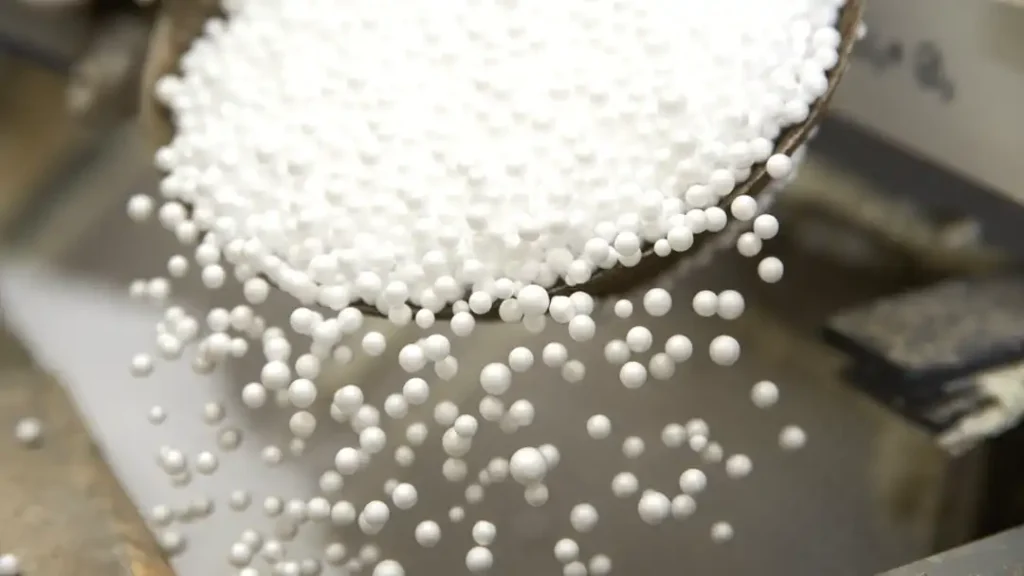Supplier of Expanded Polystyrene (EPS) From Turkey and Dubai UAE

Product Overview
Expanded Polystyrene (EPS) is a rigid, closed-cell thermoplastic foam derived from solid polystyrene beads. Through a polymerization process using a blowing agent (typically pentane), the beads are expanded up to 50 times their original volume. The resulting material consists of approximately 98% air and 2% solid polystyrene.
This unique cellular structure grants EPS an industry-leading strength-to-weight ratio, making it a critical material in modern construction, civil engineering, and cold-chain logistics.
Key Technical Properties
- Low Thermal Conductivity: Due to its high air content, EPS offers exceptional thermal resistance (R-Value), effectively inhibiting heat transfer in both heating and cooling applications.
- Compressive Strength: Despite being lightweight, EPS has high compressive strength, allowing it to withstand heavy loads in structural and geotechnical applications.
- Moisture Resistance: EPS is non-hygroscopic. It does not readily absorb moisture, maintaining its thermal and mechanical performance even in high-humidity environments.
- Chemical Inertness: It is chemically stable and does not react with concrete, plaster, or most construction materials, ensuring longevity without degradation.
- Shock Absorption: The closed-cell structure creates excellent energy-absorption characteristics, critical for impact protection.
- Sustainability: EPS is 100% recyclable. Modern mechanical and chemical recycling processes allow it to be reprocessed into new plastic products, supporting the circular economy.
Industrial Applications
1. Construction and Building Envelopes
EPS is a dominant material in energy-efficient building strategies.
- EIFS (Exterior Insulation and Finish Systems): Used as the core insulation layer for exterior walls.
- Graphite Enhanced EPS (Grey EPS): A newer generation of EPS infused with high-purity graphite, which reflects radiant heat and increases insulation performance by up to 20% compared to standard white EPS.
- ICF (Insulating Concrete Forms): Hollow EPS blocks used as forms for concrete walls, remaining in place as permanent insulation.
2. Civil Engineering (Geofoam)
EPS Geofoam is used as a lightweight fill material in infrastructure projects. It is roughly 1% of the weight of traditional soil fill.
- Applications: Road embankments, bridge abutments, slope stabilization, and retaining wall backfill.
- Benefit: significantly reduces lateral stress on structures and prevents settlement on soft soils.
3. Packaging and Cold Chain Logistics
- Protective Packaging: Custom-molded EPS buffers protect electronics and white goods during transit.
- Pharmaceutical & Food Transport: EPS creates a thermally isolated environment essential for the “Cold Chain,” keeping vaccines, biological samples, and perishables within strict temperature ranges during distribution.
4. Automotive Manufacturing
EPS contributes to vehicle lightweighting (improving fuel economy) and passenger safety.
- Uses: Bumper cores (energy absorption), door impact protection, and knee bolsters.
5. HVAC and Industrial Components
Used to mold complex shapes for air conditioning components, heat exchangers, and composite structural cores due to its insulating properties and ease of molding.
Handling, Safety, and Storage
While EPS is non-toxic and inert, adherence to safety protocols is required during storage and processing:
- Fire Safety: Standard EPS is flammable. For construction applications, ensure the use of Flame Retardant (FR) grade material. Store away from ignition sources and open flames.
- UV Exposure: prolonged exposure to direct sunlight can cause surface oxidation (yellowing) and slight embrittlement. Store materials under cover or in UV-protected packaging.
- Ventilation: When cutting EPS using hot-wire cutters, ensure adequate ventilation to disperse any fumes.
Logistics: Packing and Container Loading
Note: The following specifications apply to EPS Raw Resin (Unexpanded Beads). Once expanded into foam, the volume increases drastically, and the weight per container drops significantly.
Packaging Specifications
To ensure material integrity during international transport, EPS resin is packaged in moisture-resistant liners:
- 25 kg Multi-layer Paper/Plastic Bags: Standard for small-batch usage and easy manual handling.
- 800 kg – 1,000 kg FIBC (Jumbo Bags): Flexible Intermediate Bulk Containers are used for large-scale industrial processing to maximize handling efficiency.
Export Loading Capacities
Optimized loading plans for EPS Resin Beads in standard shipping containers:
- 20-ft General Purpose (GP) Container:
- Capacity: 17 metric tons (approximate).
- Usage: Often used for smaller orders, though less cost-efficient per ton than 40ft.
- 40-ft High Cube (HC) Container:
- Capacity: 24–25 metric tons (approximate).
- Usage: The industry standard for international trade. High Cube containers are preferred to maximize volume utilization.
- Storage Recommendation: Resin beads contain a blowing agent (pentane), which can off-gas over time. Materials should be stored in cool (below 20°C/68°F), well-ventilated areas to preserve expansion potential.
Technical Data Sheet of Expanded Polystyrene (EPS)
| Properties | |
|---|---|
| Bead Size – Diameter | 0.9 – 1.3 mm |
| Blowing Agent – Pentane | 5.6 – 7 % |
| Residual Styrene Monomer | Less than 1000ppm |
| Moisture Content | Less than 1% |
| CFC Content | Nil |
| Flammability | DIN 4102 B1, EN ISO 11925-2/ EN 13 501 E |
| Density | 13 – 20 kg/m3 |


